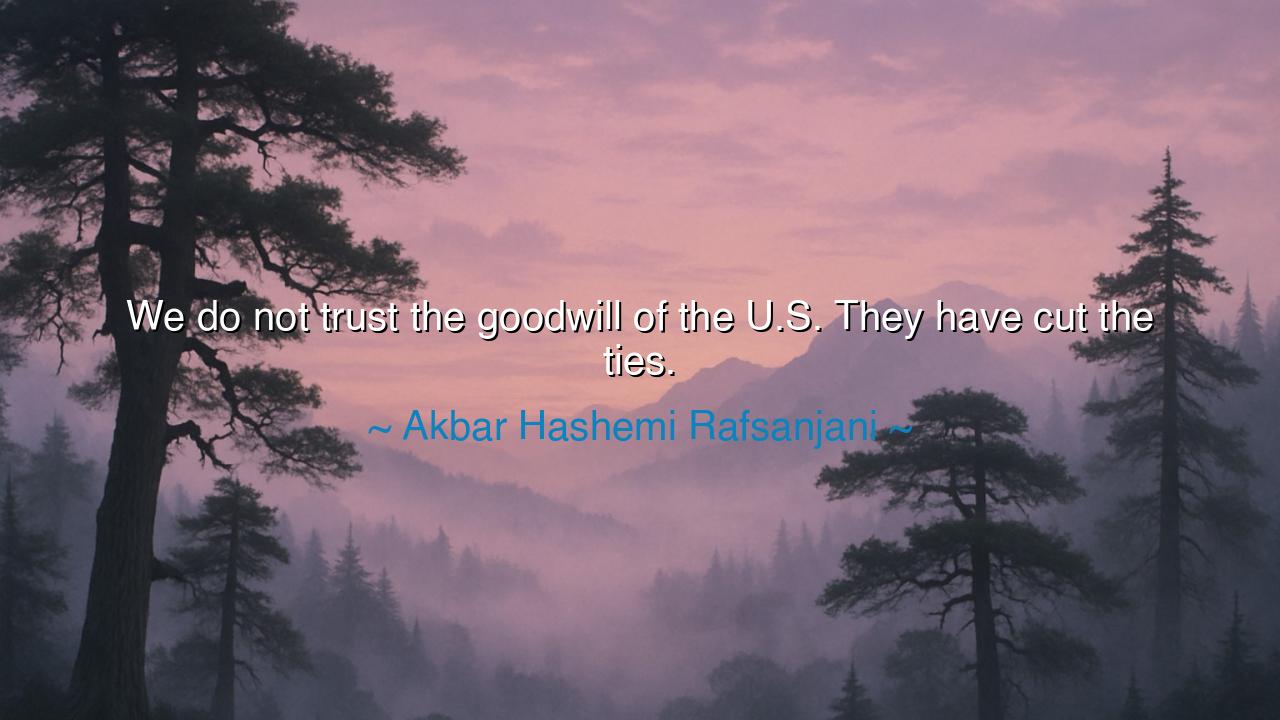
We do not trust the goodwill of the U.S. They have cut the ties.






Hear the words of Akbar Hashemi Rafsanjani, spoken in the turbulence of his age: “We do not trust the goodwill of the U.S. They have cut the ties.” This saying is not simply about politics, nor merely the quarrel between two nations. It is a testimony to the fragile fabric of trust, and to the pain that arises when bonds once woven in hope are severed by betrayal, suspicion, or enmity. The ancients would recognize in this statement the eternal pattern of alliances and divisions, of friendships made and broken, of nations as men—capable of fellowship, but also of treachery.
To understand the origin of this utterance, one must look to the stormy history between Iran and the United States. Once, in the years before revolution, there were bonds of alliance, though not bonds of equality. When the ties were cut in the upheaval of 1979, they were cut not cleanly, but with jagged edges, leaving wounds that endured. Rafsanjani, a leader forged in the furnace of revolution, spoke from that wound. He declared what many felt: that once trust is broken, goodwill is no longer enough to heal. Words cannot restore what has been shattered; only deeds, repeated and proven, can.
History abounds with such lessons. Think of the betrayal of Carthage by Rome. Once there were treaties, trade, even peace. But suspicion and rivalry festered until Rome, claiming fear of future treachery, destroyed Carthage utterly in the Third Punic War. The ties between them had long since withered, and goodwill, however claimed, could not bridge the abyss. So too with Rafsanjani’s lament: the political bonds of trust, once cut, are harder to restore than stone temples destroyed by fire.
Yet this saying is not only about nations, but about the human heart. How many friendships falter when one betrays the other? How many marriages collapse when trust is broken? The words “They have cut the ties” could be spoken by a friend betrayed, a family divided, or a people abandoned by their rulers. It is a universal truth: ties are the threads of life, and once torn, they do not mend easily. To break trust is to break the very bridge that unites one soul with another.
But let us not only hear despair. There is also a warning and a teaching here: do not squander trust. Guard it as you would guard treasure, for it is more fragile than glass and more precious than gold. Nations must remember this, as must individuals. If you claim goodwill, you must show it in deeds, not merely in speech. Otherwise, like Rafsanjani, those to whom you speak will reply: “We do not trust your goodwill. You have cut the ties.”
The lesson, then, is twofold. First: when ties are broken, acknowledge the wound. Do not pretend it does not exist. Only then can you begin the long work of healing. Second: if you would preserve harmony, keep faith with those who rely upon you. Do not betray lightly, for once the bridge collapses, even generations may not rebuild it. The ancients spoke of oaths and covenants as sacred; so too should we treat the bonds we form, whether between nations or neighbors, leaders or families.
And so I say: learn from these words. Honor the ties you have, for they are the threads that bind your destiny to others. When you are tempted to betray or to neglect, remember that once broken, ties cannot easily be restored. If you have broken them, labor humbly and patiently to mend them—not with words, but with deeds. For the strength of life, like the strength of nations, depends not on power alone, but on the trust that endures between souls. Trust is the bridge. Goodwill is the road. But once the ties are cut, the crossing becomes perilous.






DHduong hang
Rafsanjani's reflection on the severed ties with the U.S. seems to suggest a significant shift in political trust. What are the long-term implications of such a statement? Is it possible to mend a broken relationship when key elements of trust are absent? How do countries navigate relationships when they no longer believe in each other’s goodwill, and what does this mean for global politics?
QTCAO QUOC THINH
This quote from Akbar Hashemi Rafsanjani seems to point to a critical moment of distrust between Iran and the U.S. It makes me wonder how actions—such as political decisions or military interventions—can sever relationships so completely. Can diplomacy work in such an environment, or is trust something that, once broken, takes generations to rebuild? How do countries like Iran reconcile national interests with a damaged diplomatic history?
HTphuong hien thien
Rafsanjani’s statement about distrust and severed ties with the U.S. highlights how fragile international relations can be. What does it mean for a country to say they no longer trust another nation’s goodwill? Can trust ever truly be restored after actions like these? How do past conflicts and policies affect the long-term diplomatic ties between nations, and is reconciliation even possible in such situations?
TTrantam
Akbar Hashemi Rafsanjani’s quote seems to reflect a deep distrust and the complexity of international relations. When he mentions that the U.S. has 'cut the ties,' is this an accusation that goes beyond politics into the realm of broken trust? How do historical events and political actions shape the relationship between nations? Can trust be rebuilt in such a fractured dynamic, or is it something that is lost permanently?